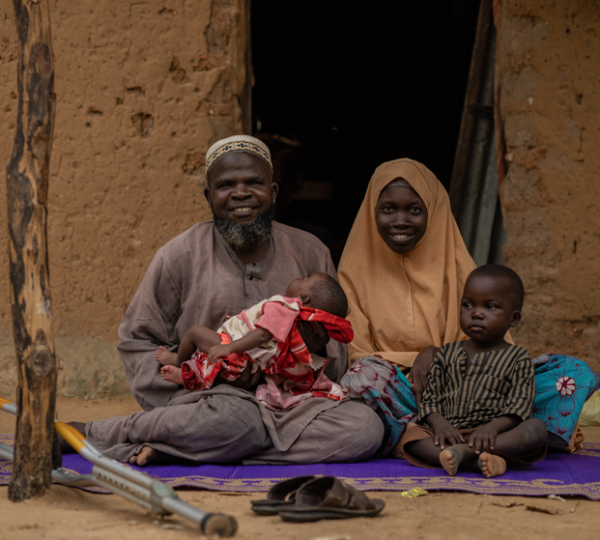The project helping Nigerians stay malaria free.
By Dr Ibimina C. Tonye-Leggjack
The Global Fund Malaria Project of the Society for Family Health (SFH) contributes to the National objectives for malaria elimination in Nigeria through Social and Behavioural Change (SBC) strategies and well-known Insecticidal Treated Net (ITN) replacement campaigns. This Project implements malaria interventions in 13 states in Nigeria. Of those 13, Niger state was one of the states where the project carried out its ITN replacement campaignthis year.
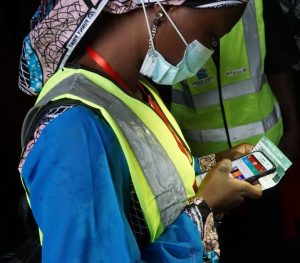
Photograph: Ibimina C. Tonye-Leggjack/Society for Family Health
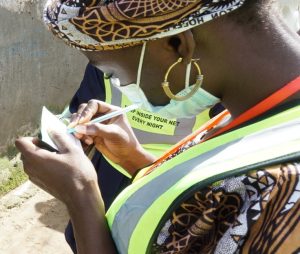
Reducing the financial Burden of Malaria
Jibril, a 23-year-old student is one of the success stories of this campaign. He first heard about the ITN campaign from the media (radio). In 2019, he received Long lasting insecticidal nets (LLINs) during a net distribution in Niger state and has used and cared for it consistently since then but believes it is now old. When asked about how he cares for the net, Jibril said “I wash the net regularly every 2 months with detergent and air-dry it.”
Even though he feels malaria episodes have reduced drastically compared to previous years, he has had 3 episodes of malaria since the beginning of the year. For each episode, he had to visit the community primary care centre for tests and medications. Citing the financial burden this often poses, he said,
“I spend N2,500 every time i go to the hospital. That money can be saved up for other things.”
However, he pointed out that there are certain things that he and other residents of the community can do to reduce and prevent frequent episodes of malaria like wearing long clothing in the evening to reduce skin exposure to mosquitoes and ensuring environments are free from bushy areas that can increase the breeding of these mosquitoes.
He was impressed by the Government of Niger state and said the campaign is a remarkable thing as it makes a huge difference in the lives of the state and community residents.
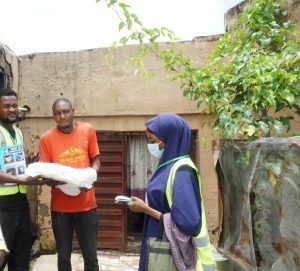
Photograph: Ibimina C. Tonye-Leggjack/Society for Family Health
The Insecticidal Treated Net-use Community Ambassador
A respected land lady in her community, 55 year old Eunice first heard about the campaign on the radio. She first received ITN about 3 years ago but feels it’s lost its efficacy. As a result, she switched to mosquito coil use to ward off mosquitoes but that came with its own problems.
Recently, she and her daughter came down with malaria and that affected her daily activities. She came down with terrible headaches and generalised body pain and had to spend money on tests and medication. Prior to getting this replacement net, she has been an ambassador for ITN use, encouraging members of her household and tenants to use the nets consistently and properly.
She’s looking forward to using the new net as she feels it is made of a stronger material and won’t tear as easily as the old one. She also expressed her desire for the government to help clean out dirty drains that encourage the spread of mosquitoes while making assurances that her tenants would always keep their environments clean.
However, she is excited that the Government of Niger state and other partners have collaborated to distribute replacement nets and feels the house-to-house and community dialogue sessions will go a long way in contributing to increased awareness of malaria control practices.
“Everytime i use the mosquito coil, i wake up with a blocked nose, so i’m glad to have a replacement mosquito net. Right away, it has been washed and dried so i can use it later at night!”
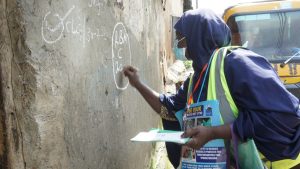
Photograph: Ibimina C. Tonye-Leggjack/Society for Family Health
Wrapping up, she said , “I am grateful to the Government of Niger state and SFH for this project. It will reduce the amount I spend on drugs and use of malaria coils. I hope they continue it in the years to come.”


